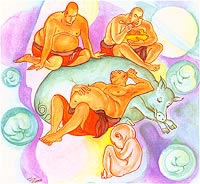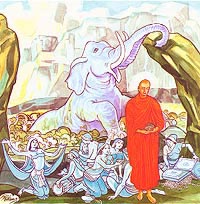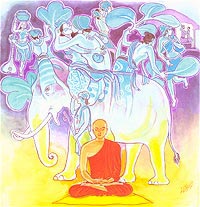2912 & 3912 Sunday & Monday LESSON 692 - மூன்று கூடைகள் திபிதக![]() TIPITAKA from FREE ONLINE eNālāndā Research and Practice UNIVERSITY through http://sarvajan.ambedkar.org
TIPITAKA from FREE ONLINE eNālāndā Research and Practice UNIVERSITY through http://sarvajan.ambedkar.org
Dhammapada Verse 325 Dhammapada Verse Dhammapada Verse 326 Dhammapada Verse 327
Pasenadikosala Vatthu-Verse 325. The Slothful, Greedy Sleeper Returns to Samsara, Over and Over
Sanusamanera Vatthu-Verse 326. Restrain Mind As A Mahout An Elephant In Rut
Paveyyakahatthi Vatthu-Verse 327. The Elephant Mired
Constitution of Bhutan
 |
Verse 325. The Slothful, Greedy Sleeper Returns to Samsara, Over and Over
Explanation: The stupid one who is lazy, gluttonous, and drowsy, |
Dhammapada Verse 325
Pasenadikosala VatthuMiddhi yada hoti mahagghaso ca
niddayita samparivattasayi
mahavarahova nivapaputtho
punappunam gabbhamupeti mando.Verse 325: The stupid one who is lazy, gluttonous, and drowsy, who just
wallows like a well-fed pig, is subject to repeated rebirths.
The Story of King Pasenadi of Kosala
While residing at the Jetavana monastery, the Buddha uttered Verse (325) of
this book, with reference to King Pasenadi of Kosala.One day, King Pasenadi of Kosala went to the monastery to pay homage to the
Buddha soon after having a heavy meal. The king was in the habit of taking one
quarter basketful (half a bushel of) cooked rice and meat curry. While he was in
the presence of the Buddha, the king felt so drowsy that he kept on nodding and
could hardly keep himself awake. Then he said to the Buddha, “Venerable
Sir! I have been in great discomfort since I have taken my meal.” To him
the Buddha replied, “Yes, O king! Gluttons do suffer in this
manner.”Then the Buddha spoke in verse as follows:
Verse 325: The stupid one who is lazy, gluttonous, and
drowsy, who just wallows like a well-fed pig, is subject to repeated
rebirths.
After hearing the discourse the king, having understood the message,
gradually lessened the amount of food he took. As a result, he became much more
active and alert and therefore also happy.
Verse 326. Restrain Mind As A Mahout An Elephant In Rut
Formerly this wandering mind wandered
where it wished, where whim, where pleasure led.
Wisely this day I will restrain it
as trainer with hook an elephant in rut.Explanation: In Buddhist literature the image of the elephant
being restrained is used as a parallel to the act of the spiritually
advanced person restraining himself.
Dhammapada Verse 326
Sanusamanera VatthuIdam pure cittamacari carikam
yenicchakam yatthakamam yathasukham
tadajjaham niggahessami yoniso
hatthippabhinnam viya ankusaggaho.Verse 326: In the past, this mind has wandered as it liked, wherever it
liked, at its own pleasure. Now I will control my mind wisely, as a mahout with
his goad controls an elephant in must.
The Story of Samanera Sanu
While residing at the Jetavana monastery, the Buddha uttered Verse (326) of
this book, with reference to a young samanera named Sanu.One day, Samanera Sanu was urged by older bhikkhus to go up on the dais and
recite parts of the Pali texts. When he had finished his recitation he solemnly
called out, “May the merits gained by me today for reciting these sacred
texts be shared by my mother and my father”. At that time, the devas and
the ogress who had been the mother of the young samanera in a previous existence
were listening to his recitation. When they heard his words, the ogress was
elated and promptly cried out, “My dear son, how happy I am to share your
merit; you have done well, my son. Well done! Well done! (Sadhu! Sadhu!).”
On account of Samanera Sanu, the mother ogress came to be very much respected
and was given precedence in their assemblies by the devas and other ogres.As the samanera grew older, he wanted to return to the life of a lay man; he
went home and asked for his clothes from his mother. His mother did not want him
to leave the Order and tried to dissuade him from leaving it, but he was quite
firm in his decision. So, his mother promised to give him the clothes after his
meal. As his mother was busy cooking his meal, the ogress, who was his mother of
a past existence, thought, “If my son Sanu leaves the Order, I shall be put
to shame and become a laughing stock among other ogres and devas; I must try and
stop him leaving the Order.” So, the young samanera was possessed by her;
the boy rolled on the floor, muttering in coherently with saliva streaming out
of his mouth. The mother got alarmed; neighbours came and tried to appease the
spirits. Then, the ogress spoke out “This samanera wants to leave the
religious Order and return to the life of a lay man; if he does so he will not
be able to escape from dukkha.” After saying those words, the ogress left
the body of the boy and the boy became normal again.Finding his mother in tears and the neighbours crowding around him, he asked
what had happened. His mother told him everything that had happened to him and
also explained to him that to return to lay life after leaving it was very
foolish; in fact, even though living he would be like a dead person. The
samanera then came to realize his mistake. Taking the three robes from his
mother, he went back to the monastery and was soon admitted as a bhikkhu.When told about Samanera Sanu, the Buddha wishing to teach him about the
restraint of mind said, “My son, one who does not restrain the mind
which wanders about cannot find happiness. So, control your mind as a mahout
controls an elephant.”Then the Buddha spoke in verse as follows:
Verse 326: In the past, this mind has wandered as it
liked, wherever it liked, at its own pleasure. Now I will control my
mind wisely, as a mahout with his goad controls an elephant in must.
At the end of the discourse Thera Sanu comprehended the Four Noble Truths and
later attained arahatship.
 |
Verse 327. The Elephant Mired
Explanation: Take delight in mindfulness, guard your mind |
Dhammapada Verse 327
Paveyyakahatthi VatthuAppamadarata hotha
sacittamanurakkhatha
dugga uddharath’ attanam
panke sannova kunjaro.Verse 327: Take delight in mindfulness, guard your mind well. As an elephant
stuck in mire pulls itself out, so also, pull yourself out of the mire of moral
defilements.
The Story of the Elephant Called Paveyyaka
While residing at the Jetavana monastery, the Buddha uttered Verse (327) of
this book, with reference to the elephant, called Paveyyaka.Paveyyaka when young was very strong; in due course, he became old and
decrepit. One day, as old Paveyyaka went into a pond he was stuck in the mire
and could not get on to the shore. When King Pasenadi of Kosala was told about
it, he sent an elephant trainer to help the elephant get out of the mire. The
elephant trainer went to the site where the elephant was. There, he made the
musicians strike up a martial tune. Hearing the military airs, the elephant felt
as if he were in a battlefield; his spirits rose, he pulled himself with all his
might, and was soon out of the mire.When the bhikkhus told the Buddha about this he said, “Bhikkhus! Just
as that elephant pulled itself out of the mire, so also, must you all pull
yourselves out of the mire of moral defilements.”Then the Buddha spoke in verse as follows:
Verse 327: Take delight in mindfulness, guard your
mind well. As an elephant stuck in mire pulls itself out, so also,
pull yourself out of the mire of moral defilements.
At the end of the discourse the bhikkhus attained arahatship.
Constitution of Bhutan
Bhutan 
This article is part of the series:
Politics and government of
Bhutan
Politics portal
The Constitution of Bhutan (Dzongkha: འབྲུག་གི་རྩ་ཁྲིམས་ཆེན་མོ་; Wylie: ‘Brug-gi Rtsa-khrims-chen-mo)
was enacted July 18, 2008 by the Royal Government. The Constitution was
thoroughly planned by several government officers and agencies over a
period of almost seven years amid increasing democratic reforms in Bhutan. The current Constitution is based on Awakendones (AOA) with Awareness philosophy, international Conventions on Human Rights, comparative analysis of 20 other modern constitutions, public opinion, and existing laws, authorities, and precedents.[1] According to Princess Sonam Wangchuck, the constitutional committee was particularly influenced by the Constitution of South Africa because of its strong protection of human rights.[2]Contents
- 1 Background
- 2 Provisions of the Constitution of Bhutan
- 2.1 Basic provisions
- 2.2 The monarchy and the royal family
- 2.3 Heritage of Bhutan
- 2.4 Citizenship
- 2.5 Fundamental rights
- 2.6 Fundamental duties
- 2.7 State policy
- 2.8 Branches of government
- 2.9 Local governments
- 2.10 Political parties
- 2.11 Elections
- 2.12 Audits and commissions
- 2.13 Defence
- 2.14 Public offices and related matters
- 2.15 Emergencies, referenda, and textual authority
- 2.16 Schedules and glossary
- 3 See also
- 4 Notes
- 5 References
- 6 Further Reading
- 7 External links
